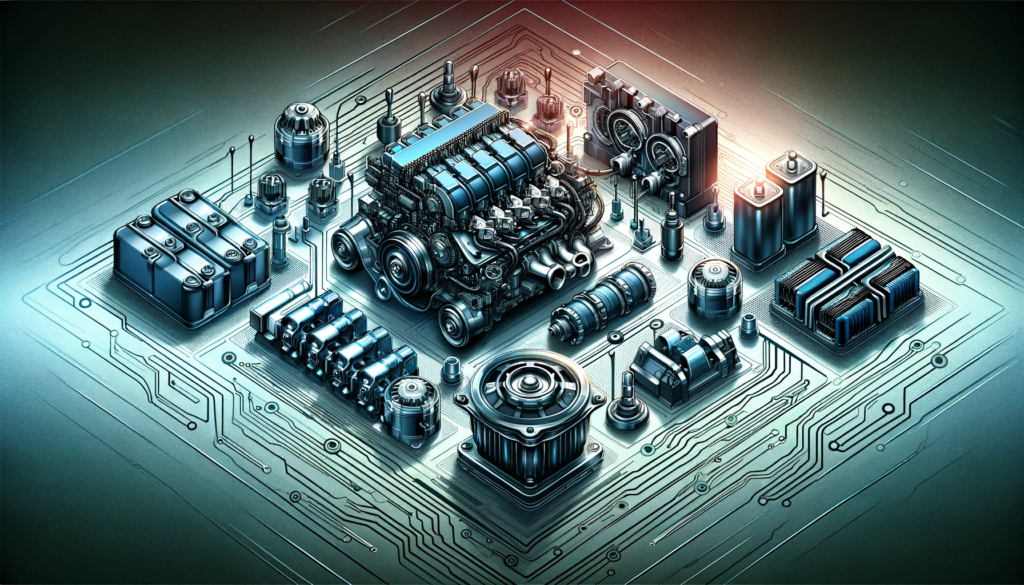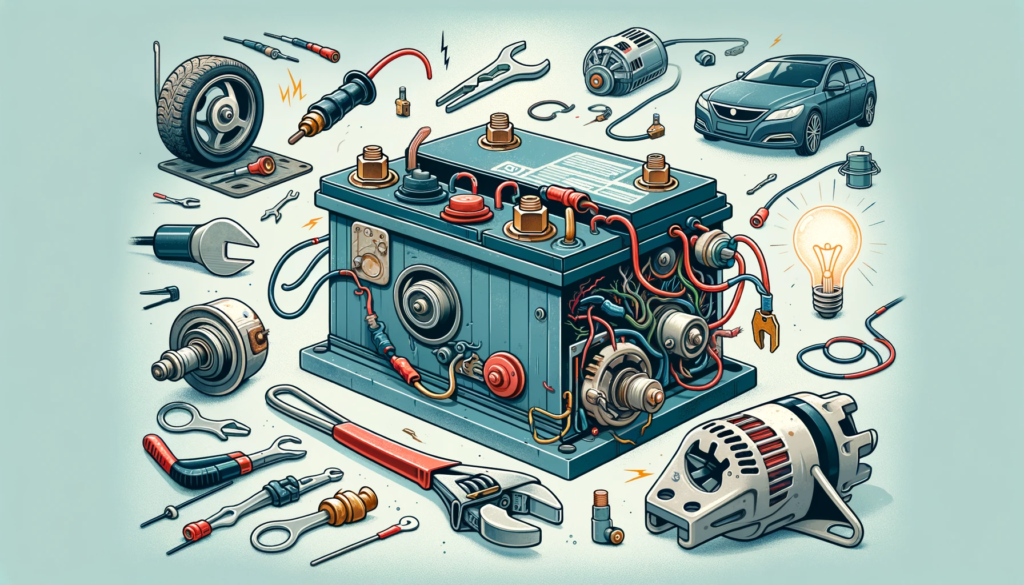Electrical Issues: Problems like corroded connectors, damaged wiring, or short circuits can disrupt the communication between the ECM and other parts of the vehicle, leading to various engine problems.

The importance of electrical systems in modern vehicles cannot be overstated. As the backbone of contemporary automotive design, these systems have evolved from basic circuitry to complex networks integral to every aspect of vehicle operation. In an era where technology and transportation intersect more than ever, understanding the role and significance of these systems is crucial.
At the heart of a vehicle’s electrical system lies the Engine Control Module (ECM), a critical component that regulates and monitors the engine’s operation. The ECM, often considered the vehicle’s brain, uses data from various sensors to optimize performance, manage fuel efficiency, and control emissions. This precision in operation is essential for the smooth running of the car, affecting everything from acceleration to fuel consumption.
Beyond the ECM, modern vehicles are equipped with an array of sophisticated features heavily reliant on electrical systems. These include advanced driver-assistance systems (ADAS), which enhance vehicle safety through features like lane-keeping assist and automatic emergency braking. Infotainment systems, now a standard in many models, provide connectivity and entertainment options, further demonstrating the diverse roles of electrical components in enhancing the driving experience.
The shift towards electric and hybrid vehicles has placed even more emphasis on the importance of robust electrical systems. In these vehicles, the electrical system is not just an accessory but the primary source of propulsion, requiring high levels of efficiency, reliability, and safety.
The complexity of these systems also brings vulnerabilities. Issues such as corroded connectors, damaged wiring, or short circuits can lead to significant problems. These malfunctions can disrupt communication between the ECM and other parts of the vehicle, potentially leading to engine problems, reduced performance, or even safety hazards. Therefore, regular maintenance of the electrical system is not just a matter of upkeep but a critical aspect of ensuring vehicle safety and reliability.
The electrical systems in modern vehicles are fundamental to their operation, efficiency, and safety. As automotive technology continues to advance, the significance of these systems will only grow, underscoring the need for proper understanding and maintenance to ensure optimal vehicle performance and safety.
Understanding the Vehicle’s Electrical System
Understanding the vehicle’s electrical system is essential to comprehending how modern vehicles function. This system is a complex network that involves various components working in unison to ensure the smooth operation of the vehicle.
At its most basic level, the vehicle’s electrical system can be divided into three key components: the battery, the alternator, and the wiring that connects them to the various components of the car.
1. Battery: The battery provides the electrical power needed to start the engine. It is also responsible for powering the electronic components of the car when the engine is not running. The battery stores electricity in a chemical form and converts it back into electrical energy when needed.
2. Alternator: Once the engine is running, the alternator takes over as the primary source of electrical power. It is essentially a generator that produces electricity to power the vehicle’s systems and recharge the battery. The alternator is vital for maintaining the battery’s charge and providing a consistent energy supply to the vehicle’s electrical system.
3. Wiring and Electrical Components: The electrical system’s wiring is a complex network that connects the battery and alternator to various components, such as the lights, ignition system, and electronic control units (ECUs). These components include everything from the starter motor, which turns the engine over, to the sensors and ECUs that control engine performance and emissions. Modern vehicles also include a range of convenience and safety features like power windows, navigation systems, and driver assistance technologies, all powered by the electrical system.
The heart of the modern vehicle’s electrical system is the ECU, or in more complex systems, multiple ECUs. The Engine Control Module (ECM), a type of ECU, plays a critical role in managing the engine’s functioning by monitoring and adjusting the fuel mixture, ignition timing, and emissions control systems based on data received from a network of sensors. These sensors measure everything from engine temperature and air intake to fuel level and emission outputs.
Another critical aspect of the vehicle’s electrical system is the fuse box, which contains a series of fuses and relays. Fuses are safety devices that protect the electrical system by breaking the circuit if the current flowing through it exceeds a safe level. This prevents damage to the components and potential electrical fires.
The electrical system also includes various switches, connectors, and control modules. These are used to operate different vehicle systems like the lighting, heating, and air conditioning systems. The complexity of these systems has increased with the introduction of touchscreen interfaces and voice control technologies.
The vehicle’s electrical system is a complex and integral part of modern vehicles. It not only powers the starter and ignition systems but also supports a wide range of safety, comfort, and convenience features. Understanding this system is crucial for diagnosing issues, performing maintenance, and appreciating the technological advancements in automotive design.
Common Electrical Problems

Common electrical problems in vehicles can range from minor annoyances to major issues that can affect a car’s performance and safety. These problems often stem from the aging of the vehicle, wear and tear, environmental factors, and sometimes manufacturing defects. Understanding these common issues can help in early diagnosis and repair, ensuring the longevity and safety of the vehicle.
1. Dead Battery: One of the most frequent electrical issues in a vehicle is a dead battery. Car batteries typically last between three to five years. Factors like weather conditions, frequent short trips, and leaving lights on when the engine is off can drain the battery faster. A dead battery will prevent the car from starting, requiring a jump start or a battery replacement.
2. Corroded Battery Connectors: Corrosion on battery terminals can lead to poor conductivity and can prevent the car from starting or cause electrical components to function intermittently. Corrosion appears as a white, ashy deposit on the terminals and can be cleaned with a brush and proper cleaning solution.
3. Alternator Problems: The alternator charges the battery and powers the electrical system while the engine is running. Symptoms of a failing alternator include dimming or overly bright lights, a dead battery, slow or malfunctioning accessories, and sometimes a growling or whining noise from the engine.
4. Faulty Starter: The starter is responsible for initiating the engine’s operation. A faulty starter may result in a clicking noise when turning the key, or the engine might not start at all. Often, this problem is confused with a dead battery, so it’s important to distinguish between the two.
5. Blown Fuses: Over time, the vehicle’s fuses can blow due to age or electrical surges. This can lead to the malfunction of any component on the same circuit. Replacing a blown fuse is relatively straightforward, but it’s crucial to understand the underlying cause to prevent future occurrences.
6. Damaged Wiring: Wires can degrade over time due to heat, moisture, or physical damage. This can lead to short circuits, poor performance of electrical components, or intermittent electrical problems. Wiring issues can be challenging to diagnose as the wiring harness runs throughout the vehicle.
7. Malfunctioning Sensors: Modern vehicles are equipped with numerous sensors that monitor and control various functions like engine temperature, oxygen levels, and more. Faulty sensors can send incorrect signals to the car’s computer system, resulting in decreased performance, increased emissions, or engine misfires.
8. Electrical System Overloads: Adding aftermarket accessories that draw a lot of power (like high-performance audio systems) can overload the vehicle’s electrical system. This can lead to blown fuses, dimmed lights, and can strain the battery and alternator.
9. Ignition System Failures: Problems in the ignition system, including the ignition switch and coil, can prevent the engine from starting. Symptoms may include stalling, power loss, or the engine failing to start altogether.
10. Lighting Issues: Headlights, taillights, and interior lights can fail due to burned-out bulbs, fuse problems, or wiring issues. Consistent lighting issues might indicate a deeper electrical problem.
Regular maintenance and inspections are key to preventing and addressing these common electrical problems. If you notice any signs of electrical issues, it’s advisable to have your vehicle checked by a professional to diagnose and rectify the problem effectively. Addressing electrical issues promptly can prevent more significant problems down the road and ensure your vehicle remains reliable and safe.
Impact on ECM and Vehicle Performance
The Engine Control Module (ECM), often referred to as the vehicle’s brain, plays a crucial role in managing and optimizing the performance of a car’s engine. It is a sophisticated piece of technology that controls and monitors a plethora of engine functions. When electrical problems occur, they can have a significant impact on the ECM and, consequently, on the overall performance of the vehicle.
1. Engine Performance: The ECM is responsible for controlling the air-fuel mixture, ignition timing, and idle speed, among other critical engine functions. Electrical issues, such as short circuits or faulty wiring, can disrupt the signals sent to and from the ECM. This can lead to an improper air-fuel mixture, causing the engine to run lean (too much air) or rich (too much fuel). Such conditions can reduce engine efficiency, increase emissions, and potentially lead to engine damage.
2. Sensor Data Accuracy: The ECM relies heavily on data from various sensors, such as oxygen sensors, throttle position sensors, and mass airflow sensors, to make real-time adjustments. Electrical issues that interfere with the accuracy of sensor data can lead to incorrect adjustments by the ECM, affecting engine performance, fuel economy, and emissions.
3. Engine Misfires and Stalling: Disruptions in ECM communication due to electrical issues can cause engine misfires or stalling. This is often because the ECM cannot accurately control the timing of fuel injection and ignition systems. Frequent misfires can lead to increased exhaust emissions and potentially damage the catalytic converter.
5. Difficulty in Starting the Engine: Electrical issues can prevent the ECM from engaging the starting process effectively. This could be due to problems with the starter circuit or other components that the ECM interacts with. As a result, drivers might experience difficulty or delays in starting the engine.
6. Triggering Warning Lights: The ECM is also responsible for monitoring the vehicle’s systems and alerting the driver to potential problems. Electrical issues can trigger warning lights on the dashboard, such as the check engine light, even if there is no serious mechanical issue with the car.
7. Compromised Fuel Efficiency: Since the ECM optimizes engine performance for maximum fuel efficiency, any disruption in its operation due to electrical issues can lead to decreased fuel economy. This could result in the vehicle consuming more fuel than normal for the same distance or conditions.
8. Impact on Advanced Features: In modern vehicles, the ECM is interconnected with other systems like the transmission control module and advanced driver-assistance systems. Electrical issues affecting the ECM can, therefore, have a cascading effect, impacting these other systems and diminishing the overall driving experience.
The impact of electrical issues on the ECM and vehicle performance is profound. These problems can lead to decreased engine efficiency, increased emissions, safety risks, and overall reduced reliability of the vehicle. Regular maintenance and prompt attention to electrical issues are key to ensuring that the ECM functions optimally, maintaining the vehicle’s performance and safety.
Diagnosing Electrical Problems
The Engine Control Module (ECM), often referred to as the vehicle’s brain, plays a crucial role in managing and optimizing the performance of a car’s engine. It is a sophisticated piece of technology that controls and monitors a plethora of engine functions. When electrical problems occur, they can have a significant impact on the ECM and, consequently, on the overall performance of the vehicle.
1. Engine Performance: The ECM is responsible for controlling the air-fuel mixture, ignition timing, and idle speed, among other critical engine functions. Electrical issues, such as short circuits or faulty wiring, can disrupt the signals sent to and from the ECM. This can lead to an improper air-fuel mixture, causing the engine to run lean (too much air) or rich (too much fuel). Such conditions can reduce engine efficiency, increase emissions, and potentially lead to engine damage.
2. Sensor Data Accuracy: The ECM relies heavily on data from various sensors, such as oxygen sensors, throttle position sensors, and mass airflow sensors, to make real-time adjustments. Electrical issues that interfere with the accuracy of sensor data can lead to incorrect adjustments by the ECM, affecting engine performance, fuel economy, and emissions.
3. Engine Misfires and Stalling: Disruptions in ECM communication due to electrical issues can cause engine misfires or stalling. This is often because the ECM cannot accurately control the timing of fuel injection and ignition systems. Frequent misfires can lead to increased exhaust emissions and potentially damage the catalytic converter.
4. Erratic Vehicle Behavior: Electrical problems can cause the ECM to receive sporadic or false data, leading to erratic vehicle behavior. This might manifest as sudden jerking movements, fluctuating idle speeds, or unexpected acceleration, all of which can compromise driving safety.
5. Difficulty in Starting the Engine: Electrical issues can prevent the ECM from engaging the starting process effectively. This could be due to problems with the starter circuit or other components that the ECM interacts with. As a result, drivers might experience difficulty or delays in starting the engine.
6. Triggering Warning Lights: The ECM is also responsible for monitoring the vehicle’s systems and alerting the driver to potential problems. Electrical issues can trigger warning lights on the dashboard, such as the check engine light, even if there is no serious mechanical issue with the car.
7. Compromised Fuel Efficiency: Since the ECM optimizes engine performance for maximum fuel efficiency, any disruption in its operation due to electrical issues can lead to decreased fuel economy. This could result in the vehicle consuming more fuel than normal for the same distance or conditions.
8. Impact on Advanced Features: In modern vehicles, the ECM is interconnected with other systems like the transmission control module and advanced driver-assistance systems. Electrical issues affecting the ECM can, therefore, have a cascading effect, impacting these other systems and diminishing the overall driving experience.
The impact of electrical issues on the ECM and vehicle performance is profound. These problems can lead to decreased engine efficiency, increased emissions, safety risks, and overall reduced reliability of the vehicle. Regular maintenance and prompt attention to electrical issues are key to ensuring that the ECM functions optimally, maintaining the vehicle’s performance and safety.
Preventive Measures and Maintenance Tips
The Engine Control Module (ECM), often referred to as the vehicle’s brain, plays a crucial role in managing and optimizing the performance of a car’s engine. It is a sophisticated piece of technology that controls and monitors a plethora of engine functions. When electrical problems occur, they can have a significant impact on the ECM and, consequently, on the overall performance of the vehicle.
1. Engine Performance: The ECM is responsible for controlling the air-fuel mixture, ignition timing, and idle speed, among other critical engine functions. Electrical issues, such as short circuits or faulty wiring, can disrupt the signals sent to and from the ECM. This can lead to an improper air-fuel mixture, causing the engine to run lean (too much air) or rich (too much fuel). Such conditions can reduce engine efficiency, increase emissions, and potentially lead to engine damage.
2. Sensor Data Accuracy: The ECM relies heavily on data from various sensors, such as oxygen sensors, throttle position sensors, and mass airflow sensors, to make real-time adjustments. Electrical issues that interfere with the accuracy of sensor data can lead to incorrect adjustments by the ECM, affecting engine performance, fuel economy, and emissions.
3. Engine Misfires and Stalling: Disruptions in ECM communication due to electrical issues can cause engine misfires or stalling. This is often because the ECM cannot accurately control the timing of fuel injection and ignition systems. Frequent misfires can lead to increased exhaust emissions and potentially damage the catalytic converter.
4. Erratic Vehicle Behavior: Electrical problems can cause the ECM to receive sporadic or false data, leading to erratic vehicle behavior. This might manifest as sudden jerking movements, fluctuating idle speeds, or unexpected acceleration, all of which can compromise driving safety.
5. Difficulty in Starting the Engine: Electrical issues can prevent the ECM from engaging the starting process effectively. This could be due to problems with the starter circuit or other components that the ECM interacts with. As a result, drivers might experience difficulty or delays in starting the engine.
6. Triggering Warning Lights: The ECM is also responsible for monitoring the vehicle’s systems and alerting the driver to potential problems. Electrical issues can trigger warning lights on the dashboard, such as the check engine light, even if there is no serious mechanical issue with the car.
7. Compromised Fuel Efficiency: Since the ECM optimizes engine performance for maximum fuel efficiency, any disruption in its operation due to electrical issues can lead to decreased fuel economy. This could result in the vehicle consuming more fuel than normal for the same distance or conditions.
8. Impact on Advanced Features: In modern vehicles, the ECM is interconnected with other systems like the transmission control module and advanced driver-assistance systems. Electrical issues affecting the ECM can, therefore, have a cascading effect, impacting these other systems and diminishing the overall driving experience.
The impact of electrical issues on the ECM and vehicle performance is profound. These problems can lead to decreased engine efficiency, increased emissions, safety risks, and overall reduced reliability of the vehicle. Regular maintenance and prompt attention to electrical issues are key to ensuring that the ECM functions optimally, maintaining the vehicle’s performance and safety.

